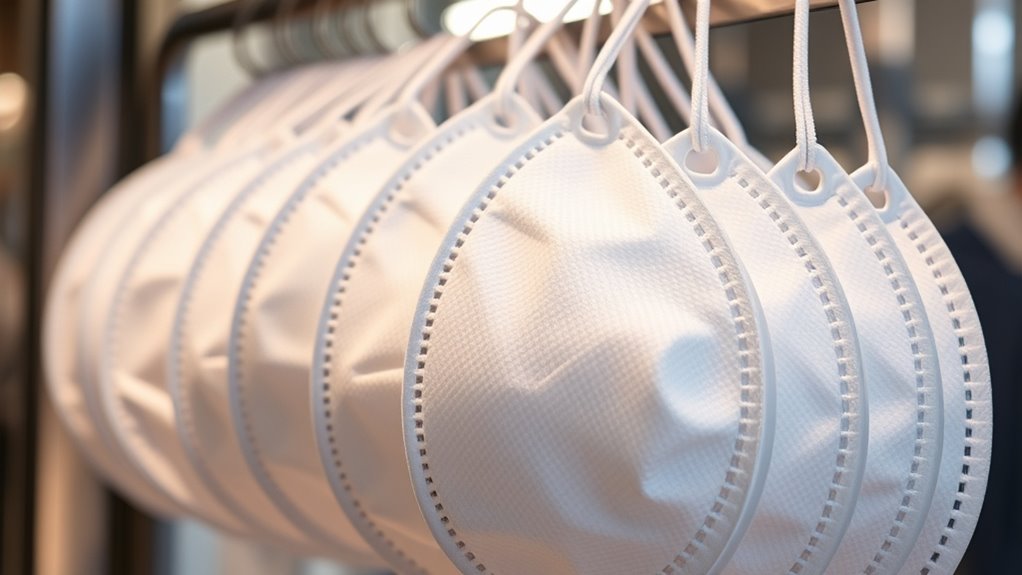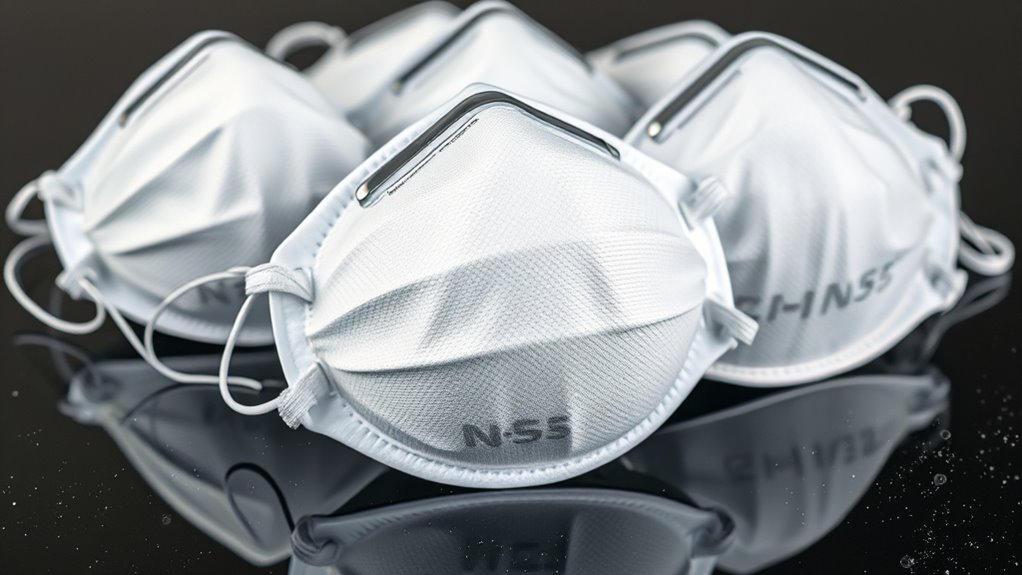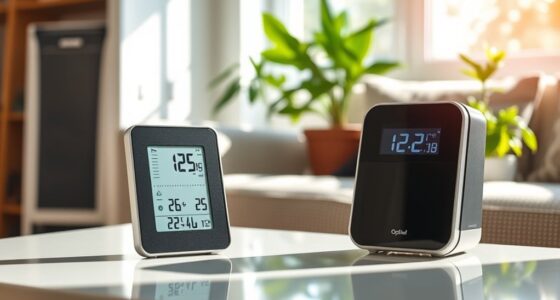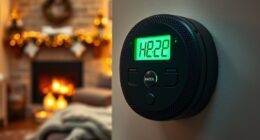N-95 masks and respirators are highly effective at protecting you from airborne allergens and chemical exposures, filtering out at least 95% of tiny particles such as pollen, pet dander, mold spores, and various fumes. They form a snug seal around your nose and mouth to block harmful substances from entering your respiratory system. Proper use and fit are key to ensuring maximum protection. To discover more about their full capabilities, keep exploring how they can safeguard your health.
Key Takeaways
- N-95 masks effectively filter airborne allergens like pollen, pet dander, and mold spores, reducing allergic reactions.
- They provide a physical barrier against chemical vapors and fumes when properly fitted, enhancing chemical exposure protection.
- N-95 respirators are suitable for industrial environments with airborne chemical hazards and allergens, ensuring safety compliance.
- Proper mask fit and timely replacement are essential to maintain filtration efficiency against allergens and chemicals.
- While highly effective for particles, N-95 masks do not typically filter gases or vapors without specialized filters.

N-95 masks and respirators are essential tools in protecting yourself from airborne particles, including viruses, bacteria, and pollution. These masks are designed to filter out at least 95% of airborne particles, making them highly effective for various environments and situations. Whether you’re working in industrial applications or prioritizing consumer safety, understanding how these masks function can help you make informed decisions about your protection. In industrial settings, N-95 masks serve as a critical barrier against dust, fumes, and chemical vapors, safeguarding workers from inhaling hazardous substances. Industries such as construction, manufacturing, and healthcare rely heavily on these respirators to maintain safety standards, minimize health risks, and comply with regulations. They are particularly useful when exposure to airborne contaminants is unavoidable, providing a reliable form of personal protection that prevents long-term health issues caused by inhaling harmful particles.
For consumer safety, N-95 masks are equally vital. During health crises like pandemics, they help reduce the transmission of airborne viruses and bacteria, especially in crowded or enclosed spaces. By filtering out tiny infectious particles, these masks help protect not only yourself but also those around you. When used properly, they act as a physical barrier, preventing respiratory droplets from entering your nose and mouth. This makes them especially valuable during flu seasons or in areas with high pollution levels. Aside from infectious disease prevention, N-95 masks also shield you from allergens like pollen, pet dander, and mold spores, which can trigger allergies or asthma attacks. Their ability to filter chemical vapors is also beneficial if you’re exposed to fumes from cleaning agents, paints, or other household chemicals. Additionally, the durability and fit of these masks are crucial factors in their overall effectiveness.
Using N-95 masks correctly enhances their effectiveness. Guarantee a snug fit around your nose and mouth without gaps. When working in industrial environments, follow safety protocols and replace the mask when it becomes damp or damaged. In everyday scenarios, choose the right size and don’t reuse masks designed for single use, to maintain ideal filtration. The versatility of N-95 masks makes them suitable for both professional and personal applications, emphasizing their importance in maintaining health and safety standards. Whether you’re working on a construction site or navigating crowded public spaces, these masks provide a reliable barrier against a wide range of airborne hazards. Their role in industrial applications and consumer safety underscores their value as a frontline defense against airborne contaminants, helping you breathe easier and stay healthier in various environments.
Frequently Asked Questions
Can N-95 Masks Be Reused Safely After Contamination?
You should avoid reusing N-95 masks after contamination, as it increases the contamination risk and compromises reuse safety. If the mask becomes contaminated or damaged, it’s best to discard it and use a new one. Proper storage between uses can help, but the safest option is to follow manufacturer guidelines and health authority recommendations. Reusing contaminated masks can expose you to harmful particles, so prioritize safety by replacing them when necessary.
How Do N-95 Masks Compare to Other Respirators for Chemical Protection?
You notice the fog of chemical vapors swirling around you, and you realize N-95 masks mainly excel at filtering allergens, not chemicals. Compared to specialized respirators, they lack the robust chemical filtration and material effectiveness needed for hazardous chemical exposure. For true protection, you need a respirator designed with activated carbon filters or chemical-resistant materials, ensuring a secure barrier against dangerous vapors and particles.
Are N-95 Masks Effective Against All Types of Airborne Allergens?
Yes, N-95 masks are effective against many airborne allergens because they provide good dust filtration and act as allergen barriers. They trap particles like pollen, mold spores, and pet dander, reducing your exposure. However, they might not block very tiny allergens or gases. For thorough allergy protection, consider masks with higher filtration standards or additional barrier layers. Always guarantee proper fit for maximum effectiveness.
What Is the Proper Way to Dispose of Used N-95 Masks?
To properly dispose of used N-95 masks, you should carefully remove them by handling only the straps to avoid contamination. Place the mask in a sealed plastic bag, then dispose of it in your trash. To prevent contamination, wash your hands thoroughly afterward. This mask disposal method minimizes the risk of spreading germs and keeps your environment safe. Always follow local guidelines for medical waste if applicable.
Do N-95 Masks Offer Protection Against Virus Particles Beyond COVID-19?
Yes, N-95 masks provide effective virus protection beyond COVID-19. Their high mask filtration efficiency blocks many airborne virus particles, including influenza and other respiratory pathogens. You can rely on them to reduce your risk of infection in environments with high viral loads. Just make certain proper fit and usage to maximize their filtration capabilities, as their effectiveness depends on a snug seal and correct handling.
Conclusion
In short, selecting the right N-95 mask shields you from harmful allergens and chemicals. By understanding their filtering finesse, you can confidently combat contaminants and create a safer space. Keep your knowledge keen, your mask snug, and your safety supreme. Remember, proper protection is powerful, preventing peril and promoting peace of mind. Stay smart, stay safe, and let your mask make a meaningful difference in your daily life.









